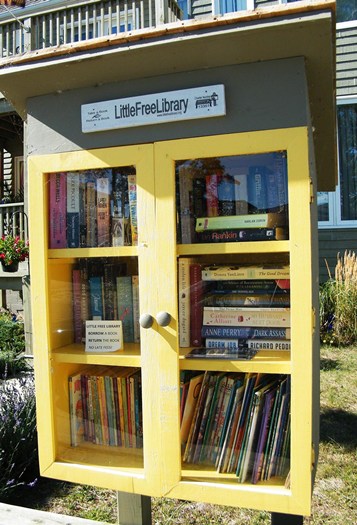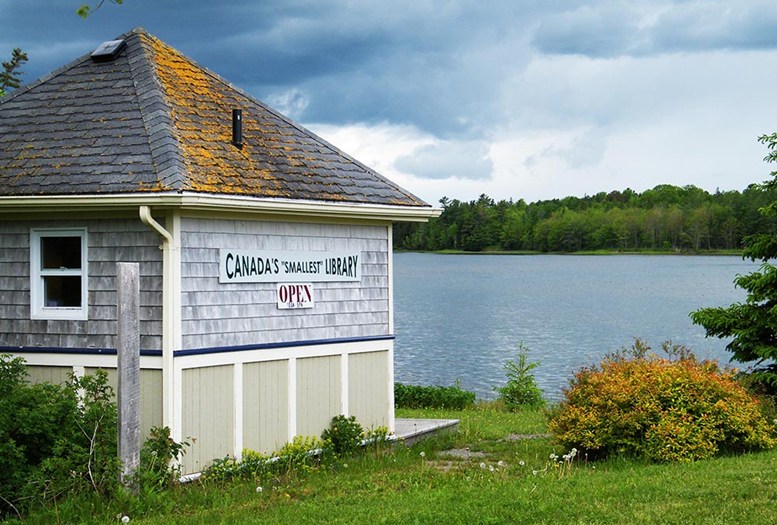GALT, ON - WHEN I WRITE about libraries, it’s with great sheepishness. In Grade 4, I buried three library books from Mount Pleasant Elementary School because I was immobilized by fear. The books were long overdue and the consequences (the wrath of the head librarian) were better resolved with the deft work of a spade by the pond. I claimed that the books had been returned long ago and were obviously shelved by a student helper unfamiliar with the Dewey Decimal system. Crisis averted.
It should come as no surprise (or maybe it does), that I am an unswerving ambassador for public libraries now. I champion them, bragging about all the indie docs and off-the-cuff titles our local branch orders in by request. They host live painting competitions and a “Cineseries” that brings Toronto International Film Fest heavyweights to our tiny West Galt outpost.
A few years ago, Carole Pope of post-punk Rough Trade notoriety, told a Toronto Life interviewer that next to her Fender Mustang guitar and Vivienne Westwood raincoat, her Toronto Public Library card was one of the Top 10 things she couldn’t live without. See? Even rock stars love libraries.
The debate over the future of libraries has been an ongoing arm-wrestling match. How will the old brick and mortar institutions survive the swift convenience of a book download from Amazon? Who still travels with weighty books when every critical travel item from a headlamp to a sleeping bag has been redesigned into micro lightness?


Above: Libraries pop up in the oddest places - outside an Egyptian museum or on a back road in Canada.
Despite the growing population that has signed up for Team Kindle and the like, the library renaissance is here. Colourful Little Free Libraries are popping up in neighbourhoods like dandelions, relying on the age-old honour system of take a book, leave a book. Traditional libraries are upping the ante, too, and integrating social media, coffee shops and sometimes even serving beer. You can check out paperbacks and guitars at some locations. At The Kitchen Library in Toronto, you can borrow a waffle iron or ice cream maker for up to seven days. For a one-time loan, members pay $15 or can opt for a $9/month fee for an annual membership. In Ottawa, The Human Library Project allows patrons to sign out one of 30 human books at its events. You can borrow a human for a 20-minute interaction and hear personal accounts about Asperger’s, Post
Traumatic Stress Disorder or drug addiction. Launchedin Denmark in 2000, the idea was to create dialogue between different community groups and combat violence. Ottawa’s Human Library has since become the biggest of its kind in the world.
As our concept of libraries transforms into human books, juicers and ukeleles, those that represent a different time and tradition will still exist in storied glory. Next to downing a pint at the Guinness Storehouse’s Gravity Bar, the Book of Kells at the Library of Trinity College in Dublin is a mainstay on visitors’ itineraries. The 9th-century gospel manuscript (illustrated with the blood of insects by monks) can be marvelled at under glass, or from your laptop thanks to their digital collections online repository.
While some choose to see the tallest waterfalls in the world, or eat hot dogs at all of America’s ballparks, I will continue to look for the most peculiar, ancient or contemporary libraries of the world.
Here are a few libraries that you need to visit for a shelfie of your own:
The Royal Library of Alexandria, Egypt: The Bibliotheca Alexandria once housed the largest collection of books and papyrus scrolls in the world but 2,000 ago, a tragic fire vanquished the mighty works of Socrates, Homer and Plato. There are several myths and suspicion surrounding the existence of this famed ancient library by scholars. Reopened in October 2002, this Mediterranean seaport library is the book lover’s parallel to a climber’s affection for Everest.
The Taha Hussien Library offers special software services for the blind and visually impaired. The Rare Books Collection has over 15,000 titles, the earliest dating back to 1496. Courtesy of the French National Library, there are over 500,000 French books, which makes it the biggest collection of French books outside of France. With an arts and multimedia cinema club and International Training Program for young Arabs, the library has continued its commitment to academia, dialogue and cultural literacy.
Canada’s Smallest Library, Cardigan, P.E.I.: Tucked in the pocket of a drowsy fishing community, Cardigan’s library is on par with the square footage of a backyard garden shed. Plunked on prime waterfront real estate on the eastern part of Prince Edward Island, it’s worth the winding road trip. When plotting your visit, include Panmure Island lighthouse and Rossignol Winery in Kings County (grab a bottle of their strawberry rhubarb wine).

Above: Welcome to Canada's smallest library in Prince Edward Island.
Measuring 3.5-by-3.5 metres, a lifetime membership to this library will only set you back $5. A self-checkout system (a binder with lined paper) relies on the honour system but the rules are lax. The suggested lending period is three weeks, but if you’re not from P.E.I. and the return might take a little longer, that’s okay. Just return the book if you’re ever back that way again, and maybe bring a few to donate. I picked up a copy of Virginia Woolf’s To the Lighthouse last year and will responsibly return it with a few others to keep this tiny landmark on the map. Take a meandering walk on the nearby Confederation Trail with a picnic and your bottle of Rossignol and crack the spine on your smallest library find, as we did.
Halifax Central Library, N.S.: The $55 million Central Library is a jaw dropper. It snagged the Lieutenant Governor’s Design Award in Architecture for its contemporary design (a collaboration between architectural firms in Nova Scotia and Denmark) when it opened in 2014. The rooftop terrace and fifth-floor glass cantilever roof over the entrance serves as a haven for bleary-eyed PhD students who set up base camp here with stiff Americanos and Callebaut brownies from Pavia Gallery Espresso Bar and Café. The atrium and its matrix of stairways is a whitewashed, sunshine-infused beacon. Patrons of all ages gather — with shoes kicked off even — and research passion projects in sleek study pods. With a green roof and cistern collecting rainwater, the library uses an estimated 64 per cent less water than other buildings. The juxtaposition is seen in the Jetsons-like terminals and book returns conveyor belts and chutes to upper floors. In addition to a First Nations Circle, local history room and teen lounge with video games, the book catalog includes Tagalog and Korean titles.
Amateur comedians and musicians are invited to perform on open mic nights or learn the basics of recording on Garage Band nights. There’s also Giant Jenga, Popsicle stick bridge-building competitions, yoga classes and workshops on creating your own seed bombs for the garden.
Idea Exchange, Galt, ON: In 2017, Galt’s old post office will get a $13 million restoration that will see the grand dame re-open its doors to a different clientele.
Touted as the nation’s first totally digital library, the sister space of the Cambridge library group’s Idea Exchange at Queen’s Square will lure a curious and tech-savvy crowd. With 3D printers (make your own iPod amplifier), a podcast recording studio and space to practice breakdancing choreography, the stately 1885 former Customs House and Post Office plans to be the hotspot in town, and not just for Wi-Fi.
Located on the banks of one of Canada’s Heritage Rivers, the Grand, Galt’s digital library is enticing the public with talk of a teaching kitchen, coding lessons for teens, robot-making software, a common garden and a 40-seat restaurant. Bibliophiles need not panic — the shelves of biographies and magazine racks (boasting over 250 titles) will remain at nearby Queen’s Square.
As Rosemary Bonanno, president-elect of the Canadian Library Association told the Canadian Press, “We have to be relevant to the people in our community. We have to embrace the change, and those who don’t will be left behind.”
About the Author
Jules Torti is a self-proclaimed Micro-adventure Architect and Professional Sunset Chaser. She is like a heat seeking missile, with a penchant for islands and all things Africa. She has kissed the Blarney Stone (and a giraffe), weathered a sandstorm and snowstorm in Iceland (in the same day), prepped breakfast for 23 chimpanzees in the Congo and designed colouring books for the Jane Goodall Institute in Uganda. In between she writes about the best things in life: books, beer, burgers, birds - in no particular order.